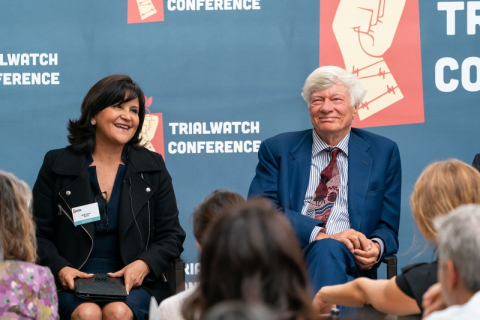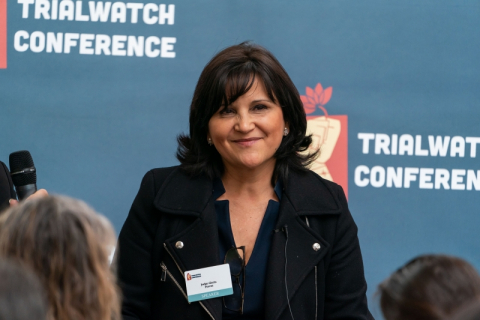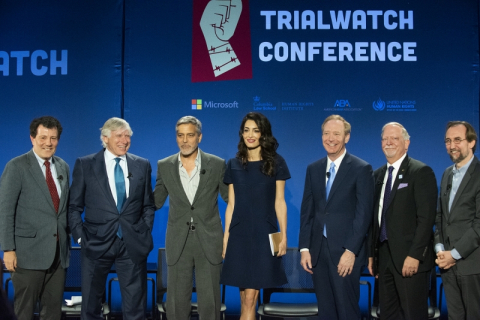Judge Gloria Porras Warns of Dangers to Judicial Independence at Launch of Clooney Foundation for Justice TrialWatch Initiative
Columbia Law School Professor Sarah Cleveland says Judge Porras and her Court have been at the forefront of anti-corruption and anti-impunity efforts, and upholding constitutional rights and the rule of law in Guatemala.
New York, May 20, 2019 – Speaking before a gathering of international lawyers, advocates, academics, and journalists on April 25 at Columbia Law School in New York City, Guatemalan Constitutional Court Judge Gloria Porras called on the international community to pay attention to the Guatemalan courts and expressed the critical need for judicial independence to protect against injustice.
"Justice doesn't have a political party. If the court doesn't uphold the rights of all under our system, then we have undermined the constitution and justice fails," said Porras during a panel discussion that was part of a day-long conference marking the formal launch of TrialWatch, an initiative of the Clooney Foundation for Justice (CFJ) that monitors trials that pose a high risk of human rights violations around the world.
"Respect for and compliance with the decisions of the court strengthen our democratic system of law,” Porras continues, highlighting the positive role judges should play in upholding justice and the need for their protection.

Judge Gloria Porras of the Constitutional Court of Guatemala and Sir Geoffrey Robertson of Doughty Street Chambers, addressed protecting judicial independence at a TrialWatch conference panel. Photo: Beatrice Moritz / Clooney Foundation for Justice (CFJ)
Porras was joined in a discussion of corruption in courts and threats to the rule of law by former President of the Maldives Mohamed Nasheed, Zimbabwean human rights lawyer Beatrice Mtetwa, renowned human rights barrister Sir Geoffrey Robinson and Jago Russell, Chief Executive of Fair Trials.
Sarah Cleveland, Louis Henkin Professor of Human and Constitutional Rights at Columbia Law School, moderated the discussion. “Judge Porras and her Court have been at the vanguard of anti-corruption and anti-impunity efforts and upholding constitutional rights and the rule of law in Guatemala,” said Cleveland. “The Constitutional Court of Guatemala is under threat. It is vital to Guatemala’s struggling democracy that the Court’s judgments be respected. We must all fight for the judges’ independence and protection.”
The panel’s focus on judicial independence in Guatemala built upon Professor Cleveland’s recent work as former vice-chair of the UN Human Rights Committee. The Committee examined Guatemala’s human rights record in April 2018 and recommended that Guatemala prioritize judicial independence and anti-corruption efforts. Cleveland investigated Guatemala’s implementation of these recommendations during a follow-up mission earlier this year.
The Dire Situation in Guatemala
Porras’ participation was both relevant and timely. Threats to judicial independence in Guatemala are concrete and personal. As recently reported in the New York Times, President Jimmy Morales has responded to criminal corruption charges against him and his family by expelling the UN anti-corruption commissioner and defying constitutional court judgments. Judges are condemned as “terrorists” and Porras and her colleagues face multiple efforts to remove them.
Porras has been forced to limit her public movements due to threats, and earlier this month, her Court was evacuated for a bomb threat while deliberating the cases of two presidential candidates. With multiple candidates charged with corruption in an election year that will determine a new president, congress and courts, the Constitutional Court is the final arbiter of the country’s future.
Judge Porras: A Leader Against Injustice in Guatemala
Gloria Porras has long been recognized as a pivotal figure protecting the independence of the judiciary in Guatemala. First elected to the Court in 2011, she was an active dissenter in some of the Court’s most criticized cases, including the technical reversal of the genocide judgment against former dictator General Efraín Rios Montt. As president of the high court in 2015, she led her colleagues in repeated decisions recognizing the rights of Guatemala’s majority indigenous population, upsetting the country’s traditional oligarchy.

Judge Porras’ decisions and steadfast commitment to constitutional rights and the rule of law in Guatemala have put her safety in danger. Photo: Beatrice Moritz / CFJ
That year, she also firmly established the Court’s independence in its decision to strip then-President Otto Perez Molina of immunity, opening the way to his impeachment, arrest, and corruption prosecution. “Rooting the Court’s decisions in international human rights law and in recognition of Guatemala’s constitutional and democratic principles, Porras and her colleagues on the Constitutional Court have been the last bastion for justice in the country,” Cleveland said.
TrialWatch: An Initiative that Monitors Trials around the World
TrialWatch is a joint initiative of CFJ with the Columbia Law School Human Rights Institute, Microsoft, the American Bar Association, and the UN Office of the High Commissioner for Human Rights. TrialWatch “represents a novel innovation that has the potential . . . to ensure the fair administration of justice and the dismantling of corrupt systems of governance around the world,” said Gillian Lester, Dean and Lucy G. Moses Professor of Law at Columbia Law School, which hosted the conference.

From left: “New York Times” op-ed columnist Nicholas Kristof, Columbia University President Lee C. Bollinger ’71, CFJ Co-Presidents George and Amal Clooney, Microsoft President Brad Smith ’84, American Bar Association President Bob Carlson, and former United Nations High Commissioner for Human Rights Zeid Ra’ad al-Hussein. Photo: Beatrice Moritz / CFJ
The initiative focuses on monitoring and responding to trials around the world that pose a high risk of human rights violations, in particular, trials involving journalists, LGBTQ persons, women and girls, religious minorities, and human rights defenders. The program is already monitoring proceedings in Africa, Asia, Europe, the Middle East, and Latin America. While these efforts roll out, all eyes will be on Guatemala’s struggle for justice.
###
The Human Rights Institute advances international human rights through education, advocacy, fact-finding, research, scholarship, and critical reflection. We work in partnership with advocates, communities, and organizations pushing for social change to develop and strengthen the human rights legal framework and mechanisms, promote justice and accountability for human rights violations, and build and amplify collective power.
Founded in 1998 by the late Professor Louis Henkin as the anchor for human rights within Columbia Law School, the Human Rights Institute promotes engagement and knowledge of human rights within the law school, throughout the University, and around world. Across the many substantive areas of its work, the Institute builds bridges between scholarship and activism, develops capacity within the legal community, engages governments, and models new strategies for progress.
Follow us on Twitter: @columbialaw and @CLSHumanRights
